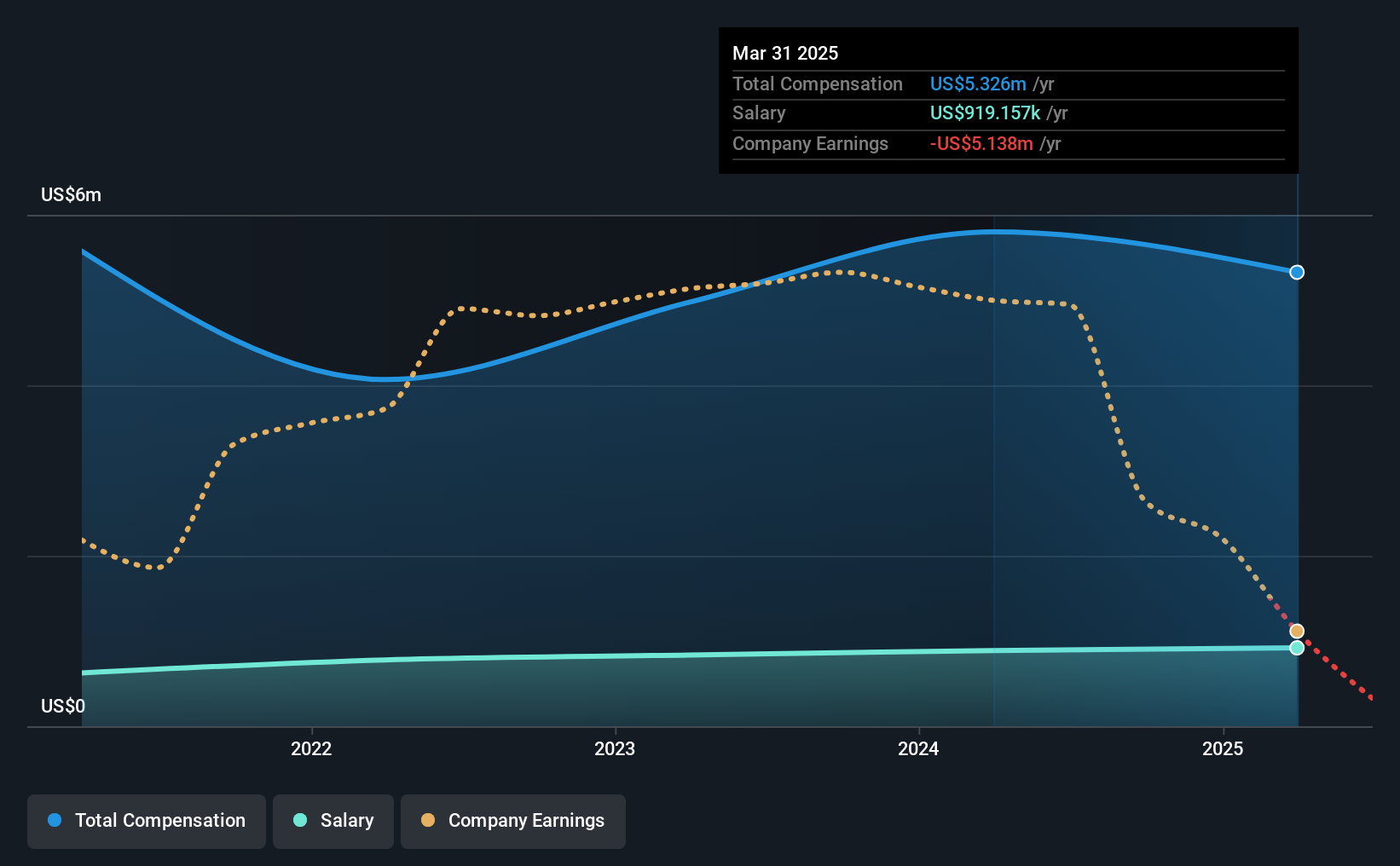

Key Insights
- Columbus McKinnon will host its Annual General Meeting on 15th of August
- Total pay for CEO David Wilson includes US$919.2k salary
- The overall pay is 94% above the industry average
- Over the past three years, Columbus McKinnon's EPS fell by 53% and over the past three years, the total loss to shareholders 57%
The results at Columbus McKinnon Corporation (NASDAQ:CMCO) have been quite disappointing recently and CEO David Wilson bears some responsibility for this. Shareholders will be interested in what the board will have to say about turning performance around at the next AGM on 15th of August. They will also get a chance to influence managerial decision-making through voting on resolutions such as executive remuneration, which may impact firm value in the future. The data we present below explains why we think CEO compensation is not consistent with recent performance.
Check out our latest analysis for Columbus McKinnon
Comparing Columbus McKinnon Corporation's CEO Compensation With The Industry
Our data indicates that Columbus McKinnon Corporation has a market capitalization of US$404m, and total annual CEO compensation was reported as US$5.3m for the year to March 2025. That's a notable decrease of 8.2% on last year. While we always look at total compensation first, our analysis shows that the salary component is less, at US$919k.
For comparison, other companies in the American Machinery industry with market capitalizations ranging between US$200m and US$800m had a median total CEO compensation of US$2.7m. This suggests that David Wilson is paid more than the median for the industry. Moreover, David Wilson also holds US$2.1m worth of Columbus McKinnon stock directly under their own name.
| Component | 2025 | 2024 | Proportion (2025) |
| Salary | US$919k | US$888k | 17% |
| Other | US$4.4m | US$4.9m | 83% |
| Total Compensation | US$5.3m | US$5.8m | 100% |
On an industry level, around 15% of total compensation represents salary and 85% is other remuneration. Columbus McKinnon pays out 17% of remuneration in the form of a salary, significantly higher than the industry average. If non-salary compensation dominates total pay, it's an indicator that the executive's salary is tied to company performance.

Columbus McKinnon Corporation's Growth
Over the last three years, Columbus McKinnon Corporation has shrunk its earnings per share by 53% per year. It saw its revenue drop 5.8% over the last year.
The decline in EPS is a bit concerning. And the impression is worse when you consider revenue is down year-on-year. These factors suggest that the business performance wouldn't really justify a high pay packet for the CEO. Historical performance can sometimes be a good indicator on what's coming up next but if you want to peer into the company's future you might be interested in this free visualization of analyst forecasts.
Has Columbus McKinnon Corporation Been A Good Investment?
With a total shareholder return of -57% over three years, Columbus McKinnon Corporation shareholders would by and large be disappointed. This suggests it would be unwise for the company to pay the CEO too generously.
To Conclude...
Not only have shareholders not seen a favorable return on their investment, but the business hasn't performed well either. Few shareholders would be willing to award the CEO with a pay raise. At the upcoming AGM, management will get a chance to explain how they plan to get the business back on track and address the concerns from investors.
CEO compensation is an important area to keep your eyes on, but we've also need to pay attention to other attributes of the company. We did our research and identified 2 warning signs (and 1 which is concerning) in Columbus McKinnon we think you should know about.
Important note: Columbus McKinnon is an exciting stock, but we understand investors may be looking for an unencumbered balance sheet and blockbuster returns. You might find something better in this list of interesting companies with high ROE and low debt.
Have feedback on this article? Concerned about the content? Get in touch with us directly. Alternatively, email editorial-team (at) simplywallst.com.
This article by Simply Wall St is general in nature. We provide commentary based on historical data and analyst forecasts only using an unbiased methodology and our articles are not intended to be financial advice. It does not constitute a recommendation to buy or sell any stock, and does not take account of your objectives, or your financial situation. We aim to bring you long-term focused analysis driven by fundamental data. Note that our analysis may not factor in the latest price-sensitive company announcements or qualitative material. Simply Wall St has no position in any stocks mentioned.